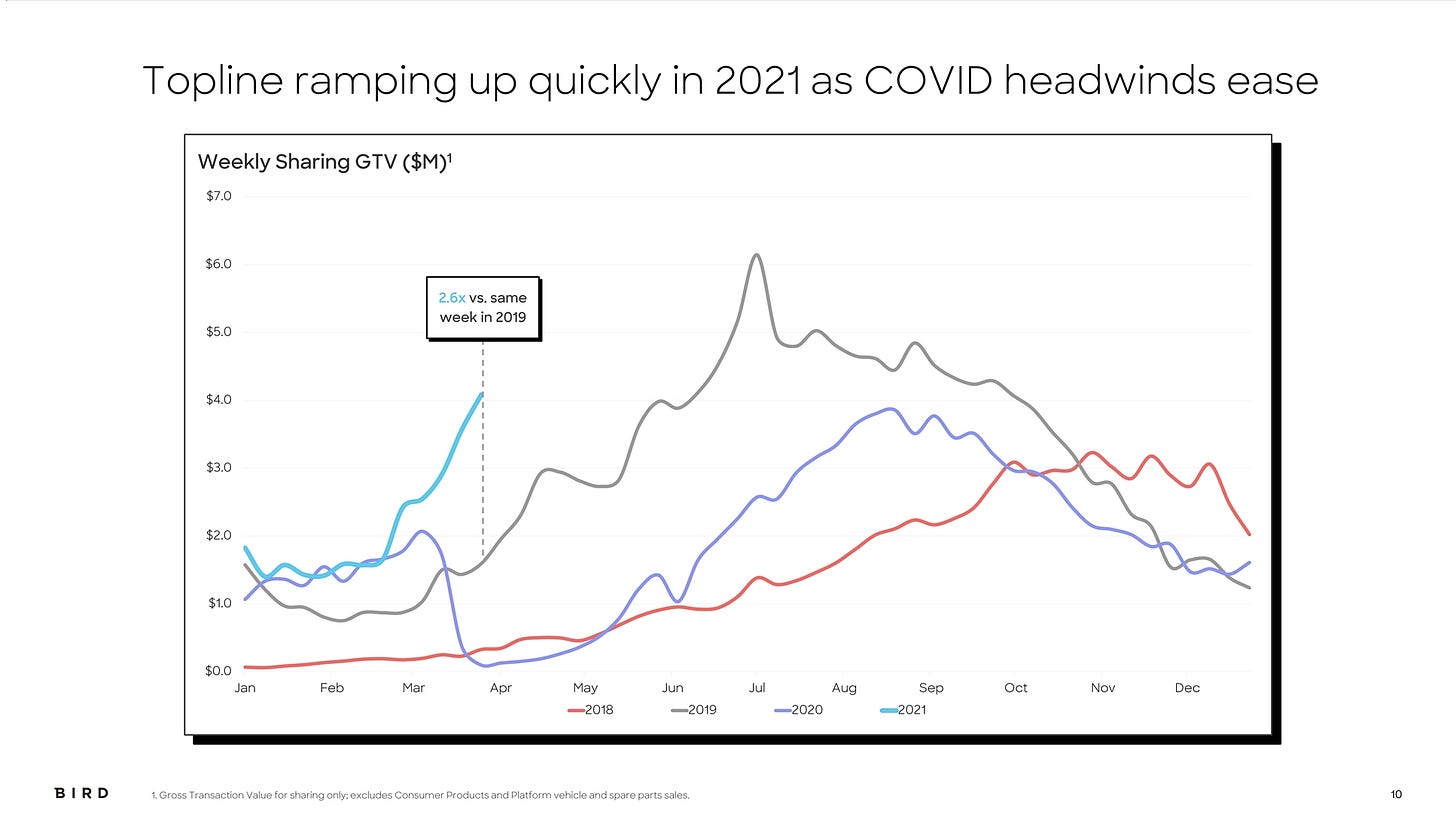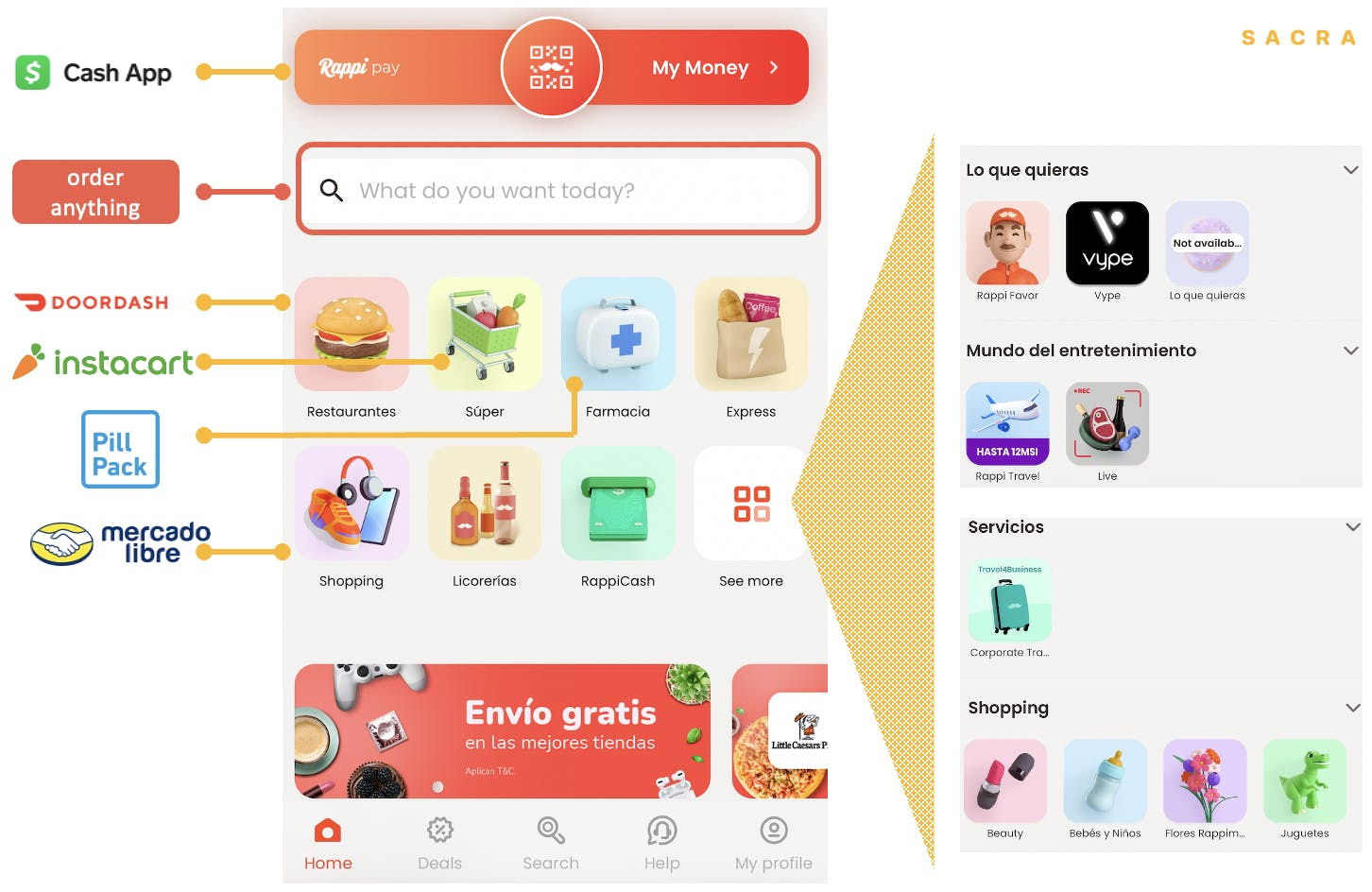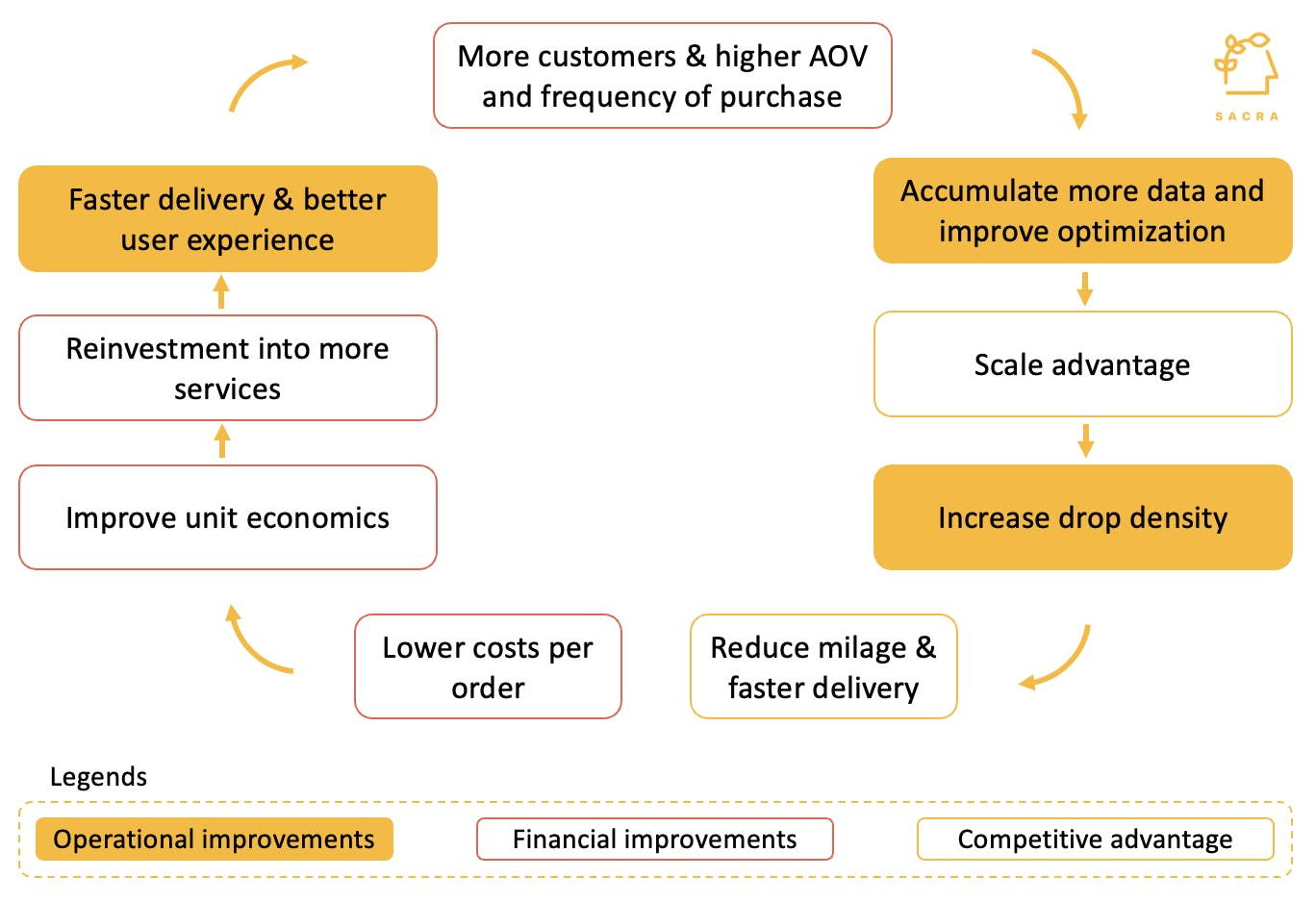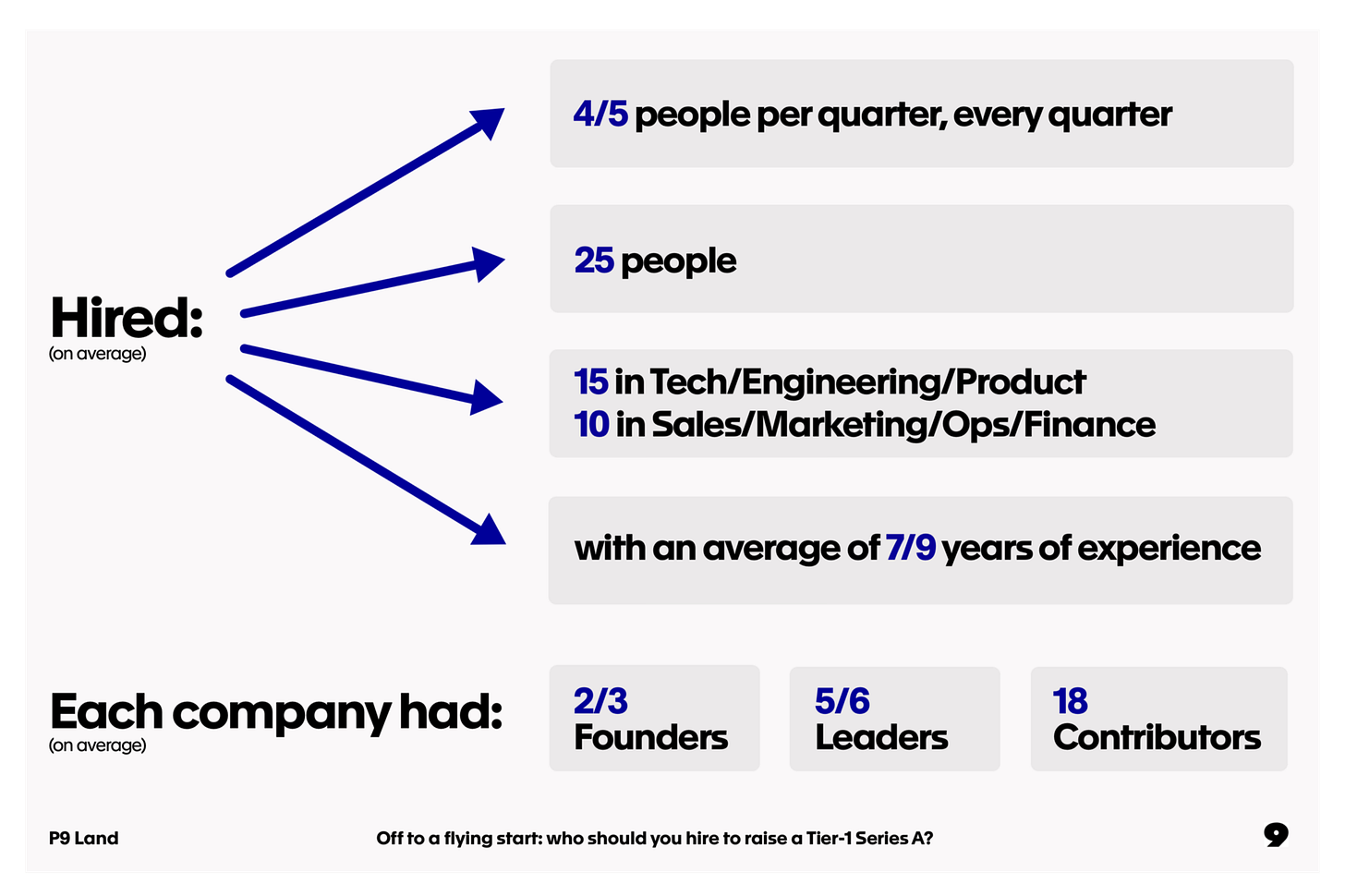Hi, it’s Alexandre from Eurazeo (ex. Idinvest). I’m investing in seed & series A European consumer startups. Overlooked is a weekly newsletter about underrated trends in the European tech industry. Today, I’m sharing the most insightful tech news of May.
For 2021, I wanted to pick one piece of news per day and write a short comment about it. I want to talk about something that strikes me. Something that happened in the tech ecosystem. Here is the issue for May!
Please note that the date picked for each event is not always the exact event date but the one at which I decided to write about the event.
Saturday, May 1st: San-Mateo-based and B2B specialist venture fund Emergence raised two new funds: a $575m early stage fund VI (vs. $435m for the fund V raised in 2018 and $335m for the fund IV raised in 2015) and a $335m opportunity fund. Emergence was an early investor in companies like Zoom, Veeva, Bill.com or Box. - Techcrunch, Emergence
Sunday, May 2nd: Techcrunch published a deep dive on Duolingo. - Techcrunch
Metrics: 500m downloads, 40m active users, 1.5m subscribers (4% of the active user base vs. 3% in 2020), $190m in booked revenues in 2020.
The company was founded in 2011 as a crowdsourced translation marketplace between (i) people translating content from one language to another to learn a new language and (ii) websites which wanted to translate their pages into multiple languages.
Duolingo was only launched as an Apple app to learn foreign languages with flash cards in 2012. It became Apple's app of the year in 2013.
The app was built early on as something entertaining (vivid colours, gamification, etc.) contrasting with existing consumer solutions in the education sector.
Duolingo played on the emergence of the meme culture to drive viral acquisition through user generated content. Users were playing with the Duolingo's mascot to talk about their experience on the app.
Duolingo is exploring several strategic initiatives to expand its market: (i) the Duolingo English Test which aims at replacing the TOEFL as a proficiency language test to join a university or to get a job, (ii) Duolingo ABC which is an app to learn English dedicated to kids between 3 and 6 years old.
The team is constantly A/B testing screens and features (100 tests at a given point). The team tests on a given course before expanding to all the courses and tests local features to take into account the specificities of a given geography.
Monday, May 3rd: Creandum’s principal Peter Specht wrote a paper on productivity tools. He believes that there is space for productivity startups helping individuals to prioritise their time and find a good balance between work and private moments especially in a work from home set up. When you build a company in the space, you should focus on the following topics: (i) having a unique insight to make your product desirable, (ii) having a good entry point and the potential to expand in the whole productivity stack, (iii) easy to be included in the workflow of your users, (iv) a great UX and (v) a good GTM knowing that viral growth is often key in this space. - Peter Specht
Tuesday, May 4th: Shift raised a $220m round led by Advent at a $1bn+ valuation (🦄) with the participation of new investors Avenir Growth and BPI as well as historical investors Accel, Bessemer Venture Partners, General Catalyst and Iris. Shift was founded in 2014 as a AI-based fraud detection solution and automated claim management solution for insurers. It has now a full suite of products for insurers and it serves 100 customers in 25 countries. Shift will use the funding to expand its product line, to enter new geographies and to add verticals (P&C insurance and healthcare insurance). - Shift
Wednesday, May 5th: Stride raised a second £100m fund to invest primarily in London and more opportunistically in other European countries. - Fred Destin, Techcrunch
"The breakup of the LPs in the fund is 10% fund of funds, 60% other institutional, 28% family offices and 10% individuals." It took Stride only 10 weeks to raised its fund II (vs. 15 months for fund I). It's not surprising considering the track record the fund I (Cazoo floated on the public market at a $7bn valuation and 11 of the first 13 investments which raised follow-on rounds like Impala and Strapi).
Stride will have two investment strategies: (i) leading or co-leading seed rounds with a £0.75-4.00m tickets, (ii) signing £250k pre-seed cheques with simple terms, no board seat and targeted help on specific topics (recruitment, strategy, fundraising).
Thursday, May 6th: Rapchat raised a $2.3m seed round co-led by Adjacent and Sony. Rapchat is a subscription based mobile which let users created rap tracks singing on top of crowdsourced beats. It has 7m registered users, 500k MAUs, 100k beats and 250k songs added to the app every month. Users are spending 35 min on average on the app and people are using the app for both content creation and consumption. - Techcrunch, Rapchat
Friday, May 7th: Subscription management SaaS for ecommerce Recharge raised a $227m series B at a $2.1bn valuation from Summit, Bain and Iconiq. Recharge was founded in Dec. 2014 and was bootstrapped until an undisclosed $50m series A led by Summit in January 2020. The company is profitable, has 320 employees (vs. 140 in Jan. 2020) and enjoyed a 146% ARR growth in 2020. Recharge will use the funding to expand its product offering beyond subscription management to anything that can help merchants boost their revenues or cut their costs. It will expand into other ecommerce platforms beyond Shopify like BigCommerce, Salesforce Commerce Cloud and Magento. It will also pursue its geographical expansion beyond the U.S.. - Techcrunch
Saturday, May 8th: I watched a webinar with Jimmy Davis who is the head of acquisition and CRM at Fiit, a U.K.-based subscription fitness app. He talked about how the app 5x its growth in the past 10 months. - App Promotion Summit
In Jan. 20, Fiit was already the 1st rated fitness app in the UK App Store with 600k classes completed, 18 training plans, 400 different classes and 2.5 classes per week taken by users.
In Jan. 21, Fiit had over 5m classes completed, 30 training plans, 650 different classes and 3 classes per week taken by users. Covid has changed the dimension of the app. Fiit is now compared to other digital fitness options like Apple Fitness+ and Peloton.
The fitness industry has completely shifted. Pre-covid, digital fitness was supposed to account for 6% of the market in 2020. In 2027, digital fitness is now supposed to reach a 35% market share. Post covid, 59% of US people said that they won't return to physical places. Digital fitness is cheaper and more convenient than physical alternatives. Moreover, the experience is almost as good as in a physical place. Compared to physical options, digital fitness is not as social and you don't have the fitness equipment.
Fiit was laser focused on a certain demographic which are individuals who want to constantly improve and level up in their fitness journey. Fiit build a strong community of engaged users that have become friends on the app. Fiit has also built features promoting community engagement and interactivity to mimic the social aspect you can have in physical places.
The app combined several social growth levers: live leaderboard classes, challenges to engage users, private group classes, social following, friend referral mechanics, and the possibility to share your achievements on social media following an exercice.
Fiit stroke several partnership with leading brands in the fitness industry to be seen as a trusted option and to be integrated into an open ecosystem of hardware (wearables, TVs, etc.).
Sunday, May 9th: I read Matt Turck's mini-series on fundraising which contains many great insights for founders. - Matt Turck
You should think of your fundraising process as a product launch because it’s a great heuristic to come up with best practices. With a product launch, you may start with an MVP and a soft-launch to iterate quickly before launching properly. With a fundraising, you can start with a first deck that you will pitch to your existing investors as well as investors that you care less about. You will use these meetings to refine your pitch and gather all the potential questions that investors can have.
Fundraising is transitioning from an art (decision based on qualitative assessment, perceptions and emotions) in pre-seed and seed to a science (data-driven) in growth rounds with series A and series B being the middle-ground where it’s both a science and an art.
The best founders have a “deep clarity of thought”. “Founders with deep clarity of thought don’t just articulate a big vision, they are also extremely convincing and credible when describing the path to make that vision a reality and making the case that they are uniquely equipped to do it.”
Monday, May 10th: Bird will go public via SPAC at an implied $2.3bn valuation. In 2020, the company laid off 30% of its workforce and its revenues declined to $95m (-37% YoY). Bird is operating in 200 different cities. In the coming months, the startup will focus on reaching profitability, launching an ebike to the market (both in retail and in ride-sharing) and transitioning toward a franchise model for new cities. - Techcrunch, Bird
Tuesday, May 11th: I read an insightful interview with Rappi's cofounder Sebastian Mejia. - Sacra
Rappi works on 3 strategic levers to differentiate from its competitors: (i) be multicategory by adding verticals to increase frequency of use, (ii) vertical integration to reduce costs and optimize unit economics, (iii) building a fintech business to facilitate scale.
Rappi has 300 dark kitchens operated by its restaurant partners to expand their business. It's a great way for Rappi to improve operations efficiency moving from a point to point model to a hub and spoke model.
Rappi launches financial services to increase the frequency of use. It has released a Rappi card accessible within the same app. It has strong cash back incentives to push users to buy things through Rappi.
"Cohort data shows that monthly purchase frequency increases from an average of 2 times in year 1 to 6 times in year 3, and 11 times in year 5."
Rappi has a search bar in which customers can type anything they want to order in a free text form. It's used a way to understand customer needs and to progressively add new categories to the product.
Wednesday, May 12th: Paypal acquired a return logistics business called Happy Returns. Happy Returns has a network of 2.6k drop-off returns locations in the U.S. and relationships with hundreds of brands using its reverse logistics services. PayPal had already invested into the company in a previous funding round. Several ecommerce payment providers are expanding their operations downstream in the value chain helping merchants to streamline their return operations. In April, Affirm made a similar move acquiring Returnly. - Techcrunch, RetailDive
Thursday, May 13th: Vinted raised a €250m series F round at a €3.5bn valuation. It's an online C2C second-hand fashion marketplace with a presence in 13 different countries. Vinted raised a previous funding round in November 2019 at a €1.1bn valuation at a time it was operating only in France, Belgium and Spain. The investment was done directly through EQT's balance sheet as a way to kickstart EQT's growth investment strategy. The funding will be use to double down on Vinted's geographical expansion and to add additional services on its marketplace (esp. around finance and logistics). - EQT, FT, Techcrunch
Friday, May 14th: Accel launched its European startup scouting program. 21 founders and startup executives were given $200k to invest in any startup they like. Scouts include individuals like Hanno Renner (cofounder at Personio), Georgie Smallwood (CPO at Tier), Tristan Thomas (ex. VP marketing at Monzo), Rika Christanto (cofounder and COO at Ontruck) and Julien Lemoine (cofounder and CTO at Algolia). Accel has been operating a similar program in the U.S. since 2017 with 3 cohorts that have invested in 200+ companies. Scouts will have carried on the investments they make and have the flexibility to pick the pace and the frequency of their investments. On average, Accel's scouts will sign $20k cheques. - Sifted
Saturday, May 15th: I listened to a Colossus' podcast episode on Calm. - Colossus
"Calm is a platform, primarily, mobile app, to help people hone their mindfulness through meditation, what we would call mental fitness, improving their sleep, and generally helping them manage the stress and anxiety of daily life."
Calm is producing content as a utility. Calm was founded in 2012 as an app to learn how to meditate on a similar value proposition as Headspace and at a time when meditation was started to go mainstream. Calm has been under-capitalized for several years compared to Headspace but has managed to overcome its direct competitor by a product expansion into sleep in 2016. Sleep is a utility. It's easier to create a recurring habit compared to learning how to meditate. You have a Pavlovian effect of users opening Calm everyday when they go to bed.
Calm has c. 50% of its subscriptions coming from organic downloads and has increased its conversion rate from 2% to somewhere between 4 and 7%. Calm is able to payback its acquisition costs upfront when users subscribe for an annual plan.
On content, Calm partnered early on with celebrities like Matthew McConaughey or James Le Bron. Content is a fixed cost (no royalty model) to avoid sharing the upside with content producers.
B2B is a strong growth lever for Calm. It distributes its product through corporations and insurers like Kaiser Permanente.
Calm has a Disney-like vision in which you will access Calm's content independently from the format that you use (a mobile app, web browser, smart mattress, distribution in hotels & smart TVs etc.).
Sunday, May 16th: Appfigures published a guide on how to design a great ATT (Ad Tracking Transparency) opt-in flow. For the pre-prompt: explain to the users why you are asking for an authorization, highlight the benefits of accepting the tracking (a short sentence + 2-3 key bullet points) and make it actionable with an explicit button. For the prompt, you are constrained by Apple. Use a simple sentence and remember the main benefit. Obviously, the key is to test several design and sentences until you reach a level of adoption that you think is satisfying. - Appfigures
Monday, May. 17th: Our portfolio company Back Market (💙), a marketplace for refurbished consumer electronics, raised a €276m round at a €2.6bn valuation (🦄) led by General Atlantic with the participation Generation Investment Management (AlGore's sustainable investment fund). It's the perfect exemple of a European consumer startup which is building a worldwide category leader based on specific European consumption habits - here the fact that I we are way ahead of other continents when it comes to second hand and sustainability. Back Market is working with 1.5k suppliers and is operating in 13 countries including the U.S. and Japan. Back Market has also launched ancillary services for both suppliers (Back Care to handle customer support) and consumers (Back Repair to connect consumers with local shops when they have a product that is still under warranty). - Techcrunch, Backmarket
Tuesday, May 18th: eFounders is now 10-year old. The French-Belgian startup studio launched 30 companies, recruited a 15-people core team, created 1.5k jobs in its portfolio companies and built a portfolio that is now worth over $2bn. eFounders is pushing the boundaries of its model: it launched a startup studio dedicated to fintech called Logic Founders and it plans to launch other verticalized startups studios in markets like healthcare, AI and blockchain. If you are brainstorming on your next startup idea, you should reach out to them and read this brillant page in which they detail the areas they are interested at the moment (no code, productivity 2.0, vertical productivity, API for X, remote-first solutions, luxury software etc.). - eFounders
Wednesday, May 19th: Pipe raised a $250m round at a $2bn valuation led by Greenspring Associates. The company was founded in Sep. 2019 and launched in Jun. 2020. Pipe is a financial marketplace between SaaS companies which want to convert their recurring revenues into upfront cash and financial investors willing to buy SaaS contracts at a discount of their annual value. 4k companies signed up on the platform including 1k since March. Pipe started with SaaS companies but it will use the funding to expand into other businesses like property managers, D2C subscription based businesses, insurance brokers, etc. Pipe has a 2% take rate on transactions on its platform (50%-50% between the buyer and the seller). In the same category, London based startup, Uncapped raised a $80m round (mix debt/equity) led by Lakestar to fund companies with recurring or predictable revenues (ecommerce, subscription, D2C, mobile apps or SaaS). It will use the funding to launch a suite of financial services for this type of customers.- Techcrunch 1 for Pipe, Techcrunch 2 for Pipe, Techcrunch for Uncapped, Business Insider
Thursday, May 20th: Mobile-first and Belin based neobroker TradeRepublic raised a $900m series C at a $5bn valuation (vs. $600m valuation in Apr. 2020) led by Sequoia (also investor in Robinhood). TradeRepublic is operating in France, Germany and Austria. It has 1m registered users and has $6bn of AUMs. - Accel, Techcrunch, Sifted
Friday, May 21st: Peter Specht from Creandum shared an insightful paper on the Spanish tech ecosystem exploring the role of foreign investors. - Peter Specht
Local growth capital is missing in Spain to lead ambitious series A and series B.
Madrid and Bacelona are the two main startups hubs in Spain. Many Spanish startups have managed to attract funding from foreign investors at seed, series A and series B stages.
Many Spanish entrepreneurs are still replicating successful business models from the US and from Western Europe which is a key limitation to build at least European tech giants and at best worldwide tech leaders.
Saturday, May 22nd: Snap organised its 2021 Snap Partner Summit with many insights on Snap's usage and new product initiatives. - Snap, Techcrunch
280m DAUs, 500m MAUs, 56% engagement rate, 30 opens per day
90% penetration rate in the UK, France, US, Australia and Netherlands of 13 to 24 y.o. for and 75% of 13 to 34 y.o.
50% of DAUs outside Europe and the US, 100% YoY DAUs growth in India over the last 5 quarters
500 content partners on Discover, 250k developers using Snap Kits
125m MAU on Spotlight, +70% of the number of Snap users spending more than 10 min per day on Spotlight, 5,400 creators have earned $130m since Nov. 2020 with Spotlight
In fall, Voodoo launched Aquapark as a Snap game adding a multiplayer layer on top of its blockbuster game. Aquapark attracted 45m players since launch and Voodoo will release 5 more games on Snap in the coming months.
Partners with Minis can earn revenues on Snap with Snap Ads, Snap tokens (IAP) or by offering their goods for purchase.
Snap is releasing a standalone app for creators called Story Studio. It's a video editing tool (trimming, adding captions, stickers, lenses, music)to make engaging vertical videos to be shared on Snap or elsewhere.
Snap also released a new monetization tool for creators with Gifts which are micro-transactions for fans to support their favorite creators.
Third party developers on Unity will be able to integrate Snap Bitmoji into their gaming experiences.
Sunday, May 23rd: Cohort-based courses platform Maven raised a $20m series A led by Andrew Chen at a16z. Maven launched in Jan. 21, has already sold $1m worth of courses and 4 creators have generated more than $100k in revenues on the platform. The company is cofounded by repeat entrepreneurs: Gagan Biyani (ex. Udemy), Seth Shreyans Bhansali (ex. Socratic) and Wes Kao (ex. alt-MBA). When MOOCs have a 3-7% completion rate, cohort based courses have a 75% completion rate because students are gathered in a much more engaging and community based experience. Maven has already convinced creators like Anthony Pompliano, Li Jin, Lenny Rachitsky and Sahil Lavingia to create their own course on the platform. - a16z, Protocol
Monday, May 24th: Loom, an asynchronous video communication tool, raised a $130m series C led by a16z with the participation of new investor Iconiq and existing investors including Kleiner Perkins, Sequoia, Coatue and General Catalyst. The company founded in 2016 experienced a 900% growth in number of users since early 2020 and has signed large enterprise customers like Netflix, Atlassian, Twitter, P&G or Lacoste. Loom has now 10m users across 120k companies. It's a super horizontal product used across multiple use cases (share updates, provide feedback, replace meetings) and functions (R&D, leadership, GTM, product). - Loom
Tuesday, May 25th: I read David Sacks's paper on how to set up a sales team in a SaaS startup. - David Sacks
David has three standardised rules: (i) the standard sales commission rate is 10% (a $100k ARR generates a $10k commission), (ii) you have a 50-50 split between base and variable compensation, (iii) a typical quota is equal to 10x the base salary.
You should put your sales on quarterly plans and when they are beyond quotas, you should give them an accelerator by increasing their commission rates to 15% on incremental sales.
An Account Executive should ramp-up in 4m.
Wednesday, May 26th: Our portfolio company Contentsquare (💙) raised the largest funding ever raised in France with a $500m round led by Softbank at a $2.8bn valuation. Contentsquare is a SaaS to create better customer experiences by analysing and acting on online customer behaviours. It has 750 customers including large enterprises like Gucci, BMW, Sephora, Verizon etc. The company has 800 employees, has grown at a 121% CAGR over the past 4 years and generates 50% of its revenues from the US. The funding will be used for both product development and geographical expansion (inc. Asia). - WSJ, Crunchbase
Thursday, May 27th: Our portfolio company Glovo (💙) acquired 3 Delivery-Hero local brands in Eastern Europe for €170m. The company will expand its grocery business and multi-category positioning in these new markets. Glovo has now a strong leadership in key markets like South West Europe, Eastern Europe and Sub-Saharan Africa which is key to have sound unit economics in the food delivery market. - Techcrunch, Tech.eu
Friday, May 28th: US-based RevenueCat raised a $40m series B led by YC Continuity Fund at a $300m post money valuation. It's a suite of tools for entrepreneurs building subscription businesses. It started with subscription management and has expanded into A/B pricing tests, analytics and customer data unification. RevenueCat is used by more than 6k apps and will use the funding to grow the team from 30 to 60 people. - RevenueCat, Techcrunch
Saturday, May 29th: Packy McCormick wrote a deep-dive on an e-commerce mobile app called Shein. - Not Boring
Shein (based in China but selling mainly overseas) generated $10bn in sales in 2020 with a 100%+ annual growth rate over the past 10y and raised an undisclosed round at a $15bn valuation in Aug. 2020. Shein is a top mobile shopping app (n°1 in the iOS shopping category in 50+ countries).
Shein is a "real-time retail company": it cuts times from design to production from 3 weeks for the best fast-fashion companies to as little as 3 days. Shein is able to produce a wide variety of relevant products quicker and cheaper than incumbents.
Sunday, May 30th: Pauliina Martikainen, investor at Maki, wrote a paper on femtech trends. She explored 3 different trends: (i) solutions fostering sexual pleasure & wellbeing (relationship management, sexual health, sex toys and sexual wellness), (ii) reproductive health and fertility (contraception, egg freezing, fertility and pregnancy), (iii) products around menopause (DtX, wareables and supplements). She also expects new opportunities around: (i) hormones management, (ii) solutions for specific segments of women in terms of conditions, (iii) longevity. - Pauliina Martikainen
Monday, May 31th: Maddy Cross wrote an amazing paper analysing the early hirings done by 15 top B2B software European companies. The average company gores from 4 people to 25 people in its first 18m meaning that you have to hire 4.5 people per quarter (when you include churn). Out of these 25 people, 15 will work in product & tech and 10 will work on sales, marketing & ops. - Maddy Cross
Thanks to Julia for the feedback! 🦒 Thanks for reading! See you next week for another issue! 👋


















